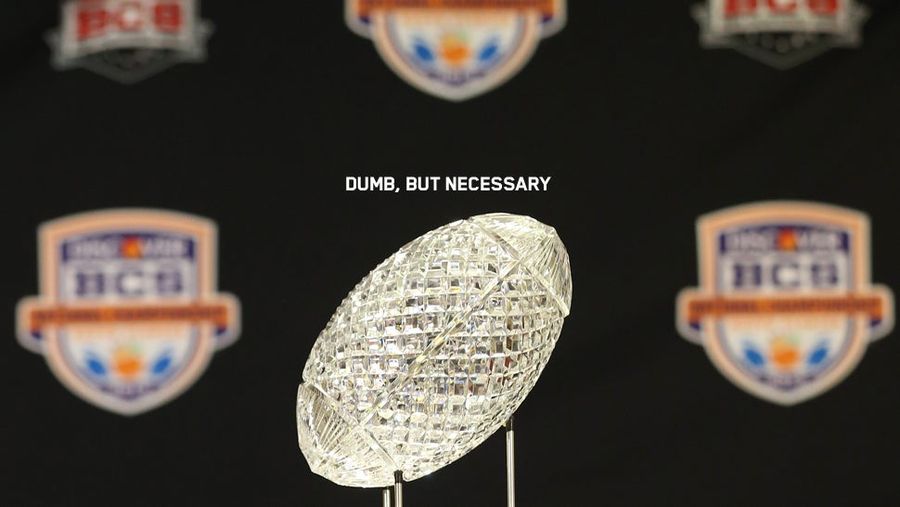Why The BCS Mattered

Sunday night, the first edition of the Bowl Championship Series standings was released for the last time, to the usual fanfare and to at least one bewildered case of Stockholm Syndrome. Is it really possible, after years of railing against the incompetence, inconsistency, and tortured existence of the BCS at every opportunity, that I'm concerned about missing the big, dumb lug?
Professionally, I'll admit, it was great fun having a villain to kick around a few times a week. Don't get me wrong: The BCS was shortsighted in conception, inadequate in execution, and unfair in sharing the spoils. It failed to satisfy economists, statisticians, or politicians off the field; it failed to satisfy fans or coaches on it. It combined the worst of old-school bias in the polls with random, bullshit math that allowed its overseers a fig leaf of "objectivity" without having to adhere to legitimate statistical analysis. (Whenever the computers came back with a result the powers-that-be didn't like, they just changed the rules the computers had to play by.) It was doomed to fail both because of what it was—a cartel, drawing deserved scrutiny from Congress and the Justice Department—and because of what it wasn't: an actual playoff. As a fan, the BCS was an idiotic blight on college football, a constant object of frustration and ridicule from within the sport and without. As a writer, it always made for great copy.
All that despite the BCS being, in reality, nothing more than a phantom organization with no offices and no employees for most of its existence. The closest thing to a headquarters at any point was a home office in suburban Kansas City. As we approached the inevitable concession to a playoff last summer, the BCS's most persistent defender, Big Ten commissioner Jim Delany, was reduced to admitting: "There is no BCS. There is a mark. There is a series of contracts. That's all it is." So fell perhaps the most despised nonentity in history.
It has earned the distinction. Now that the end is officially nigh, though, it also deserves some acknowledgment for its essential role in the evolution of the sport. It must be said: Clumsy and futile though it may have been, in the long, long run, ultimately the BCS did serve its purpose.
I don't mean its stated purpose (to match the No. 1 and No. 2 teams in the final regular-season polls in a decisive championship game, a self-fulfilling process that always "worked," by definition) or even its unstated purpose (to fill athletic department coffers with an ever-rising stream of television dollars). It achieved both, to an extent, but only to the extent that it became glaringly obvious to everyone how much more ground could be covered on both fronts by teasing out the money shot for another week or so.
No, the real legacy of the BCS will be as a missing link, the bridge from the ramshackle ethos of the 20th century to the streamlined, monetized behemoth emerging in the 21st. After decades of split championships in the polls and relatively modest revenues from the major TV networks, college football is on the verge of embracing a future defined by a long-awaited playoff structure in the postseason and an unabashed economic model that flouts any conceivable definition of "amateur" or "nonprofit." In between? The crucial stage in the transition, the Homo habilis, was the BCS.
Eventually, we may view the last two decades as the moment that the sport's disparate nerve endings began to coalesce into something resembling a central brain. True, it was primitive even for its time—college football's other divisions have been doing the playoff thing for more than 30 years, forming their first four-team brackets around the same time the NCAA basketball tournament began to take off as a major event on the sporting calendar.
But the BCS was a culmination of years of progress in its own right, beginning with the drastic expansion of television rights after they were finally wrested from the NCAA in the early '80s. The short-lived Bowl Coalition emerged from the old, pell-mell bowl system in 1992 as the first collective effort to acknowledge any interest in crowning a "true" national champion, and the Bowl Alliance took the project one step further. (It succeeded initially, matching undisputed frontrunners Nebraska and Florida in the 1996 Fiesta Bowl, but the exclusion of the Big Ten and Pac-10 prevented a "championship game" featuring undefeated Arizona State in 1996 or Michigan in 1997.) The BCS, spawned in 1998, was the first effort that successfully merged all competing interests under the same umbrella, and subsequently to convince most of the world that it did indeed represent The National Championship in major college football. If that's all it succeeded in doing, it was still a crucial success.
So, in its dying days, I am willing to give the BCS this much: It was dumb, but it was less dumb than what came before it, and it was absolutely necessary for the playoff era that's about to emerge in its wake. (Sans the computers this time.) Meanwhile, those of us who came to relish the hand-wringing, navel-gazing diatribes against The Man that spun out of the system like clockwork every November can only pray for one more inexplicable, infuriating meltdown for the road. Although, really, it would be just like the BCS to leave us hanging on that, too.
Matt Hinton writes about college football for Football Outsiders and SB Nation's Football Study Hall. Follow on Twitter, @MattRHinton.

